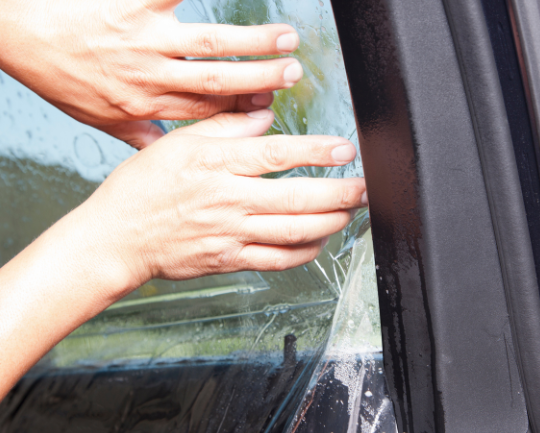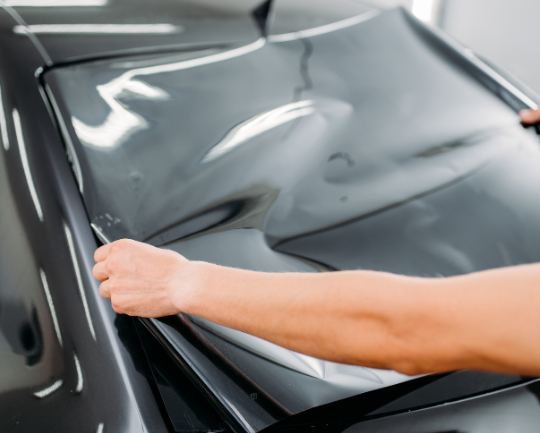Are you considering window tints but feeling overwhelmed by the options? Fear not! In this blog, we’ll embark on a journey to unravel the mysteries of window tints. From the darkest shades to the lightest hues, we’ll explore the various types available and help you decipher which one suits your needs best. Whether you’re aiming for enhanced privacy, UV protection, or simply a sleek aesthetic, there’s a tint out there tailored to your preferences. We’ll break down the differences between dyed, metallic, ceramic, and hybrid tints, shedding light on their unique features and benefits. By the end of our exploration, you’ll be equipped with the knowledge to make an informed decision, ensuring your windows not only look stylish but also serve a purpose that aligns perfectly with your lifestyle. Let’s dive into the world of window tints and find the perfect match for you!
Reducing Your Carbon Footprint: How Window Tinting Helps the Environment
 Understanding the Energy Efficiency of Window Tinting
Understanding the Energy Efficiency of Window Tinting
Window tinting acts as a barrier against solar heat gain, preventing excess heat from entering buildings during hot weather and reducing the need for air conditioning. Conversely, it helps retain heat during colder months, minimizing reliance on heating systems. By maintaining stable indoor temperatures, window tinting reduces energy consumption, thereby lowering the carbon emissions associated with energy production.
The Role of Window Tinting in Building Sustainability
Buildings are significant contributors to carbon emissions due to their energy-intensive operations. Window tinting offers a simple yet effective way to enhance the sustainability of buildings by improving their energy efficiency. Whether in residential homes, commercial offices, or industrial facilities, the installation of window tinting can lead to substantial energy savings and a corresponding reduction in greenhouse gas emissions.
Preserving Natural Resources Through UV Protection
Beyond its impact on energy consumption, window tinting provides valuable UV protection, safeguarding interior furnishings, flooring, and artwork from sun damage. By prolonging the lifespan of these materials, window tinting reduces the need for replacements, thereby conserving natural resources and reducing the environmental footprint associated with manufacturing and disposal.
Enhancing Indoor Air Quality and Comfort
Window tinting helps create a more comfortable indoor environment by reducing glare and regulating temperatures. This not only enhances occupant comfort but also contributes to improved indoor air quality by minimizing the need for mechanical ventilation systems, which often rely on energy-intensive processes.
The Environmental Ripple Effect of Window Tinting
The benefits of window tinting extend beyond individual buildings to encompass broader environmental considerations. By reducing energy demand, window tinting helps alleviate the strain on power grids, decreasing the reliance on fossil fuels and the associated air pollution and greenhouse gas emissions.
The Role of Window Tinting in Sustainable Living
Window tinting, often associated with vehicle aesthetics or privacy concerns, surprisingly emerges as a champion of sustainable living. This article delves into the pivotal role of window tinting in preserving natural resources and fostering sustainable habits.
 Extending the Lifespan of Interior Elements: One of the less discussed yet substantial benefits of window tinting lies in its ability to protect interior furnishings. Harmful UV rays penetrate through untreated windows, causing fading and degradation of furniture, carpets, and artwork. By applying window tinting, homeowners can effectively block these damaging rays, thus extending the lifespan of interior elements. This preservation not only reduces the frequency of replacements but also diminishes the demand for raw materials, contributing to resource conservation.
Extending the Lifespan of Interior Elements: One of the less discussed yet substantial benefits of window tinting lies in its ability to protect interior furnishings. Harmful UV rays penetrate through untreated windows, causing fading and degradation of furniture, carpets, and artwork. By applying window tinting, homeowners can effectively block these damaging rays, thus extending the lifespan of interior elements. This preservation not only reduces the frequency of replacements but also diminishes the demand for raw materials, contributing to resource conservation.
- Mitigating Energy Consumption: Energy efficiency is a cornerstone of sustainable living, and window tinting plays a pivotal role in this aspect. Tinted windows act as insulators, regulating indoor temperatures by reducing heat gain in summer and heat loss in winter. Consequently, buildings require less energy for heating and cooling, leading to reduced reliance on fossil fuels and lower greenhouse gas emissions. The cumulative effect of widespread adoption of window tinting can significantly contribute to energy conservation efforts on a global scale.
- Curbing Light Pollution: Moreover, excessive light emissions contribute to wasted energy and carbon emissions. Window tinting helps mitigate light pollution by controlling the amount of external light entering buildings, thereby reducing the need for artificial lighting during daytime hours. By promoting natural daylighting while minimizing light pollution, window tinting supports both environmental and human well-being.
- Enhancing Indoor Air Quality: Window tinting can serve as a barrier against outdoor contaminants, including dust, pollen, and airborne toxins. By creating a more airtight seal, tinted windows help maintain cleaner indoor air, reducing the reliance on mechanical ventilation systems and air purifiers. This improvement in indoor air quality not only benefits occupants’ health but also reduces the environmental footprint associated with air purification technologies.
- Supporting Sustainable Architecture: Architects and builders increasingly recognize the value of passive design strategies, such as optimizing natural light and ventilation, to minimize energy consumption and environmental impact. Window tinting aligns with these principles by enhancing thermal comfort, maximizing daylighting, and reducing reliance on artificial lighting and climate control systems. As a result, buildings equipped with tinted windows exhibit superior energy efficiency and occupant comfort, setting new standards for sustainable architecture.
The Comprehensive Benefits of Window Tinting
In the realm of sustainability and eco-conscious living, the significance of window tinting often goes overlooked. Yet, this simple addition to homes, offices, and vehicles holds a multitude of comprehensive benefits that extend far beyond its primary function. From energy conservation to enhancing indoor comfort and safeguarding our environment, let’s delve into the myriad advantages that window tinting offers.
Energy Efficiency
One of the most compelling benefits of window tinting is its ability to improve energy efficiency. By applying tinted film to windows, heat gain during summers and heat loss during winters can be significantly reduced. This translates to lower energy bills as heating, ventilation, and air conditioning (HVAC) systems operate more efficiently, consuming less power to maintain comfortable indoor temperatures.
UV Protection
Harmful ultraviolet (UV) rays from the sun pose various risks, including skin damage, premature aging, and even skin cancer. Window tinting acts as a barrier against UV radiation, blocking up to 99% of these harmful rays. This not only protects occupants inside buildings or vehicles but also prevents fading and deterioration of interior furnishings, such as furniture, flooring, and artwork, thus extending their lifespan.
Glare Reduction
Glare from sunlight can be a nuisance, causing eye strain and discomfort, especially in workplaces or areas with high sun exposure. Window tinting helps mitigate glare by diffusing sunlight, creating a more comfortable and visually appealing environment for occupants. This is particularly beneficial in offices, schools, and homes where productivity and relaxation are paramount.
Comfort and Productivity
Comfortable indoor environments are essential for promoting well-being, productivity, and overall quality of life. Window tinting plays a pivotal role in creating such environments by regulating indoor temperatures, reducing glare, and maintaining consistent lighting levels. Whether in homes, offices, or vehicles, occupants benefit from enhanced comfort, leading to improved concentration, mood, and performance.
Long-Term Cost Savings
While the initial investment in window tinting may require some upfront expenditure, the long-term cost savings far outweigh the initial costs. Reduced energy bills, prolonged lifespan of interior furnishings, and lower maintenance expenses contribute to significant savings over time, making window tinting a sound financial investment in addition to its environmental and functional benefits.
How Window Tinting Contributes to Building Adaptation Strategies
- Temperature Regulation: Buildings equipped with window tinting gain a significant advantage in maintaining comfortable indoor temperatures. The tinted film acts as a barrier, reducing solar heat gain during hot days and minimizing heat loss in colder conditions. This regulation not only enhances occupant comfort but also reduces reliance on energy-intensive heating and cooling systems, thereby lowering greenhouse gas emissions.
- Protection Against UV Radiation: As the ozone layer continues to deplete, UV exposure poses significant health risks, including skin cancer and premature aging. Tinted windows block a substantial portion of UV rays, safeguarding occupants’ health and well-being. Additionally, UV protection extends the lifespan of interior furnishings, such as furniture, flooring, and artwork, by preventing fading and degradation caused by prolonged sun exposure.
- Enhanced Durability: Window tinting reinforces the structural integrity of windows, making them more resistant to impacts and reducing the likelihood of shattering during severe weather conditions. This increased durability not only enhances occupant safety but also minimizes the risk of property damage and the associated environmental repercussions, such as debris generation and material waste.
- Daylight Optimization:: Window tinting facilitates daylight optimization by selectively filtering incoming sunlight, reducing glare and minimizing the need for artificial lighting. By harnessing natural daylight more efficiently, buildings can achieve significant energy savings and reduce their carbon footprint. Moreover, access to natural light has been shown to enhance productivity, mood, and overall satisfaction among occupants, contributing to a healthier indoor environment.
- Adaptation to Urban Heat Islands: Window tinting mitigates this effect by reducing solar heat gain and lowering the overall thermal load on buildings. As more structures adopt window tinting solutions, the collective impact contributes to mitigating urban heat islands, improving thermal comfort, and fostering a more sustainable urban environment.
CONCLUSION
Quality Auto Glass Tint Inc in Salida, California, we firmly believe that window tinting is indispensable for preserving the interior of your car. With our expertise and dedication to quality service, we ensure that your vehicle’s interior remains protected from harmful UV rays, excessive heat, and prying eyes. By choosing our professional tinting services, you not only enhance the aesthetic appeal of your car but also invest in its longevity and comfort. Contact us at (209) 900-8269 to experience the transformative benefits of our window tinting solutions firsthand.




